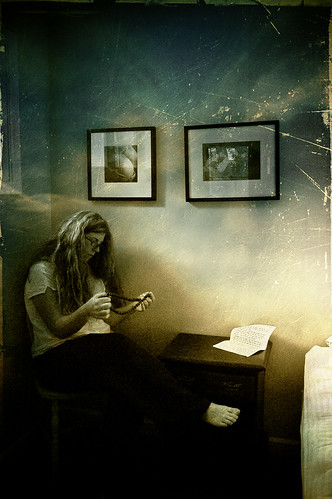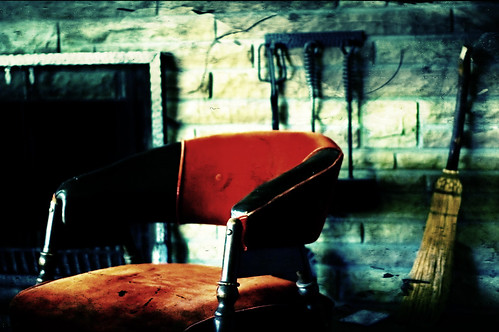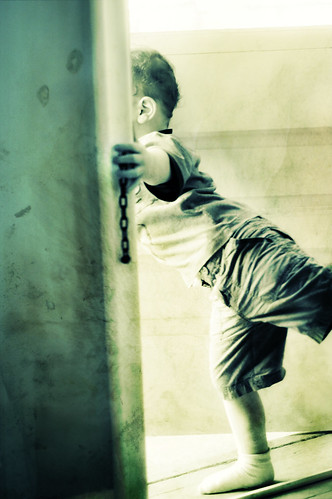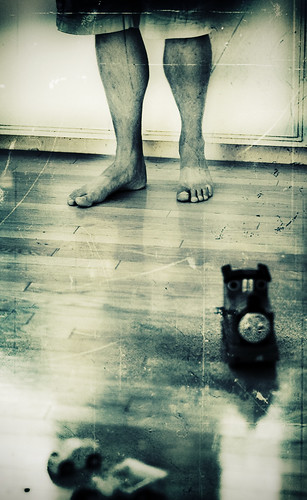"I fell for the American dream, female version, hook, line, and sinker. I, as many young women do, honest-to-god believed that once I Just Lost a Few Pounds, somehow I would suddenly be a New You, I would have Ken-doll men chasing my thin legs down with bouquets of flowers on the street, I would become rich and famous and glamorous and lose my freckles and become blond and five foot ten. I would wear cool quasi-intellectual glasses and a man's oxford shirt in a sunny New York flat and sip coffee and say Mmmm and fold my paper neatly and He would come up behind me and look at me with an adoring gaze. I would swing sexily into my red coupe, and the wind would blow through my hair as I drove into some great big city, stepping off the elevator and striding (with a feminine but authoritative step) into my office where everyone would be impressed with my every feminine but authoritative word. In the evenings I would go home and make magical gourmet meals and eat three bites, and He would look at me in the candlelight and I would be a superwoman 1980s goddess, yes indeed. As soon as I left my hometown and lost a few pounds."A couple of weeks ago, I picked up a book at my local used bookstore. I didn't know I was looking for it, but it pulled me in so thoroughly, I finished it in a weekend. It was called
Wasted: A Memoir of Anorexia and Bulimia by Marya Hornbacher. Partly it hooked me in a train wreck kind of way: I couldn't look away from its horror. But also, if I'm honest with myself, I identified with a lot of what Hornbacher said. I've never had an eating disorder, but I think most women in North America have disordered eating and fucked-up body images. Hornbacher is an extreme example, but she makes it pretty clear that, as a culture, we're pretty obsessed with thin.
When I was at the peak of my
illness and anxiety, I didn't eat much. At one point I was down to only a very few 'safe' foods that I could eat - foods that wouldn't make me sick. I could only eat in strictly prescribed situations and times, mostly at home. Although I wasn't motivated by weight loss, I did lose weight. I got angry when people congratulated my weight loss, because, intellectually, it wasn't something to congratulate -- I was sick. But I secretly enjoyed being thin. I enjoyed that when I laid on my side, I couldn't let my knees touch each other because they were so bony. I enjoyed my jutting hip bones. And I remember times when hunger pangs meant power, they were good - they meant I had nothing in my stomach to piss out my ass, that I would be safe for a little longer. Hornbacher also enjoyed the emergence of her skeleton and the power that she wrought over her body, the power she felt in hunger.
* * *
"And when you decide you are tired of being alone with your sickness, you go out seeking women friends, people who you believe can show you by example how to eat, how to live -- and you find that by and large most women are obsessed with their weight.It's a little discouraging."
* * *
"Now that I think of it, most of the women I worked with talked about diet and weight."* * *
The cafeteria at my work offers several varieties of yogurt for sale. However, they are ALL zero-percent fat, the kind with ingredient lists the size of the container, all those ingredients to make up for the fat. I prefer my yogurt with more fat and fewer ingredients.
* * *
"Women use their obsession with weight and food as a point of connection with one another, a commonality even between strangers. Instead of talking about why we use food and weight control as a means of handling emotional stress, we talk ad nauseum about the fact that we don't like our bodies. When you decide not to do that, you begin to notice how constant that talk is."* * *
I work in a woman-dominated field. Most of the women I work with are either dieting or actively managing their weight. Most of the time I don't participate, but occasionally I'm drawn into discussions. And several times various women have indicated an assumption that I must want to lose weight, that I'm struggling. Often the assumptions remain unspoken but they hang in the air, in a moment of silence, or a pointed question about my wedding photo - when did you get married? (When were you last thin?)
Yes, I'd like to lose some weight, I'd like for my body to become familiar again. But my self-worth isn't tied up in it. And I resent that others assume it is. And I'm just as willing to just accept my new(ish) shape as I am to try to change it. Frankly, diets scare me.
* * *
"When a study was done on a group of young, healthy men whose daily caloric intake was cut to just under a thousand calories, they began to: stash food surreptitiously, talk about food constantly, chew gum and mints perpetually, read recipes for dishes they couldn't make. As the study went on, they were frequently caught digging through garbage cans, sneaking into the hospital kitchen to binge. They began to purge, and -- interestingly enough -- they became incredibly worried about their weight, the shape of their bodies, and began to diet. They worried about getting dirty, got disgusted with their own biological functions, and didn't want to touch food anymore."* * *
In university I once wrote a paper for Women's Studies comparing eating disorders and plastic surgery with female circumcision in other cultures. I got a lousy grade but I still stand by the comparison. A woman I know recently asked me if I noticed a difference in her skin. I looked closely, but couldn't really see any difference, or at least not one I felt comfortable noting. She confessed that she'd gotten a chemical peel and it really, really hurt, but she couldn't see a difference. And if there wasn't any difference, she definitely wouldn't do it again because it was so painful.
I reacted all wrong. I felt so badly for her, for how awful it must feel to hate your body so much that you would choose to corrode your face just to reduce your pores and look younger. But I didn't convey my compassion very well... instead I ranted about how that is self mutilation, how nobody seems to realize how
violent plastic surgery is. How you don't solve body image problems by changing your body, how that just pulls you in further, pulls you into more and more extreme acts against your body.
I think the only thing she learned from the conversation was to never again tell me about any treatments she gets. About a week later, I did notice her skin seemed smoother, and again a few weeks after that. I guess it's working for her.
* * *
"Starving is the feminine thing to do these days, the way swooning was in Victorian times. In the 1920s, women smoked with long cigarette holders and flashed their toothpick legs. In the 1950s, women blushed and said tee-hee. In the 1960s, women swayed, eyes closed, with a silly smile on their faces. My generation and the last one feign disinterest in food. We are "too busy to eat, "too stressed" to eat. Not eating, in some ways, signifies that you have a life so full, that your busy-ness is so important, that food would be an imposition on your precious time. We claim a loss of appetite, a most-sacred aphysicality, superwomen who have conquered the feminine realm of the mind. And yet, this maxim is hardly new. A lady will eat like a bird. A lady will look like a bird, fragile boned and powerful when in flight, lifting weightless into the air."
* * *
In high school, one of my best friends was anorexic. She grew fur over her cheeks and arms while the hair on her head fell out in clumps and left bald patches. Her eyes were sunken and hungry-looking; she watched us eat like some kind of predator but I mostly only saw her eat apples. She ate them down to nothing but seeds and a stem.
I remember a girl in my chemistry class commenting that she wished she could be as thin as my friend. My telling her how sick my friend actually was didn't seem to revise her opinion. And, much as I never admitted it, there was a small part of me that, separate from worrying her heart would just quit, kind of admired how good her Guess jeans looked on her skinny arse.
* * *
"This is one of the terrible, banal truths of eating disorders: when a woman is thin in this culture, she proves her worth, in a way that no great accomplishment, no stellar career, nothing at all can match. We believe she has done what centuries of a collective unconscious insist that no woman can do -- control herself. A woman who can control herself is almost as good as a man. A thin woman can Have It All."* All italicized text is from Wasted.













